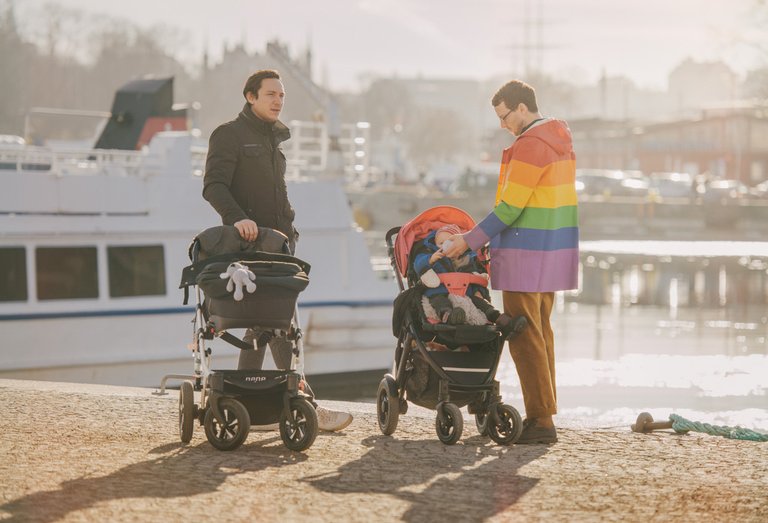Talk the talk: How to speak Swedish like a true Stockholmer
Publish date: 13 April 2022
Want to impress the locals with some universally useful Stockholm phrases? Here's how to get started!
Swedes are generally considered to be excellent English speakers. In other words, visitors that don’t speak Swedish won’t have a hard time getting around in Stockholm. But if you want to impress the locals it might be nice to get to know the local vernacular a little better.
Just like Skåne County, Gotland, and the Gothenburg region, Stockholm has its own distinctive dialect and its own vocabulary. So, while grabbing “a fika and kanelbulle” means a coffee with a delicious cinnamon bun wherever you are in Sweden, taking a “bulle” into town in Stockholm means something else entirely (more on that later).
We had a chat with Jenny Öqvist, a researcher at the Institute for Language and Folklore in Uppsala, about what characteristics are unique for the Stockholm dialect.
What would you say is distinctive for the Stockholm dialect? Has it evolved much over time?
"Characteristic for the Stockholm dialect, today as well as all through history, is its variation. People have made their way from both other towns in Sweden and other countries ever since the city was founded. So Stockholm has always been marked by its linguistic diversity".
"The Stockholm dialect also has wide social variations. There is a multi-faceted layer of business establishments, workplaces, and industries, just like in other larger cities. This creates groups of people with varying economic and social status, living in varying conditions. And the formation of social hierarchies also influences language".
"So there is in fact not just one Stockholm dialect but many, and there is much evidence pointing to this kind of social stratification being present when the dialect first evolved".
Are there many different dialects, more than for example the Östermalm and Södermalm dialects?
"All areas of Stockholm have their own distinctive social composition and status. That has been the case for a very long time, even if an area’s status has changed. Södermalm, for example, has completely different demography than it did 100 years ago [before its transition to the hotspot for Stockholm’s young and trendy creatives, 19th century Södermalm was an impoverished neighborhood with cheap housing for the working class]".
"Other parts of town have kept similar make-up all through history. Djursholm for example [a suburb in northern Stockholm] has always been populated by the wealthy. Therefore, it’s the social differences, and not the geography per se, that create the linguistic varieties in Stockholm".
Stockholmers have a tendency to pronounce the letter “Ä” [similar to the English ai-sound in “air” or “hair”] quite nasally. Almost as an “E”. Why is that?
"To pronounce the ä-sound as a short e, by saying “rev” instead of “räv” for example, [the Swedish word for fox] is characteristic of the older Stockholm dialect. The accent is called “The Stockholm E” and is closely associated with Stockholm. But it’s actually a pronunciation that is common in large parts of Uppland".
"You can still occasionally hear it today, but almost never amongst young people. Instead, it’s become more common with a more open ä-sound in recent decades. So there are actually three different accents of the sound in the Stockholm-region: the closed e-sound, the open ä-sound, and in the middle, the standard ä-sound".
There’s also a tendency to shorten words to something that ends with an “–a”, “-e” or “–is”. “Ketchup” becomes “kerre”, “Medborgarplatsen” becomes “Medis” and “bibliotek” turns into “bibbla”. Where does that come from?
"What you’re describing is simply a way of creating slang that’s quite common for the Swedish language in general, but with origins almost impossible to pinpoint. Anyway, the shortening of words - with the addition of the suffix “-is” – seems to have been around in the Swedish language for quite some time. Since the 1850’s, at least. One theory is that its origin comes from Latin where many words end with an “is”". In words like “tjorre” [replacing kiosk] and “vurre” [instead of wurst, borrowed from German and meaning sausage] the combination of consonants has been replaced with a double "r" which makes the word shorter and faster to pronounce".
Any usable words or phrases you think visitors should know?
"This might not be my area of expertise since I primarily focus on accents in my research, and not the words themselves. But greeting someone with a “Tja”, with a prolonged pronunciation of the a, is also a typical Stockholm-way of saying “hello”. Other useful words are “bulle” [slang for taxi], "tuben" [quite literally the tube which is slang for, you guessed it; the metro] and “tjacka” [slang meaning “to buy”]. Some of the unofficial names for places might be good to know as well like “Medis” for “Medborgarplatsen”, “Gullmars” instead of “Gullmarsplan” “TC” or “Centan” instead of “T-Centralen”, “Jakan” for “Jakobsberg” and so on".
Some useful Stockholm-words and phrases:
"Tja/Tjaba/Tjena": "Hey/Yo!"
"Tuben/Tricken": Subway
"Pynta": Pay
"Tjacka": Buy
"Bulle": Taxi
"Fecke": Party
"Guldfecke": A really, really, really, awesomely, fantastically, great party
"Stålar/flis": Cash
"Lagom": "Not too much and not too little, but just about right"
"Schyrre!": "Nice!"
"Aveeest serru!": "You betcha'!"
"Hur 'e läget?": What's up?
"Vi gittar/schappar/bladar/rullar/kilar/knallar": "Let's get outta here"
"Ska vi dela på en bulle?": "Wanna split a cab?"
"Va sarru'?": "Excuse me, I didn't hear what you said. Could you be so kind as to please repeat that?"
"En vurre/vurre med bröd, tack": "A hotdog, please"
"Jag ska ba pynta för biran så kan vi blada": "I'll just pay for the beer and we'll be on our way"
"Men alltså eru skön eller?": "I disagree" or "You're kidding, right?"
"Men alltså skojaru eller?": "You gotta be @&#$& kidding..."
"Men liksom ba...": "Eh..."
